 Petzlover
Petzlover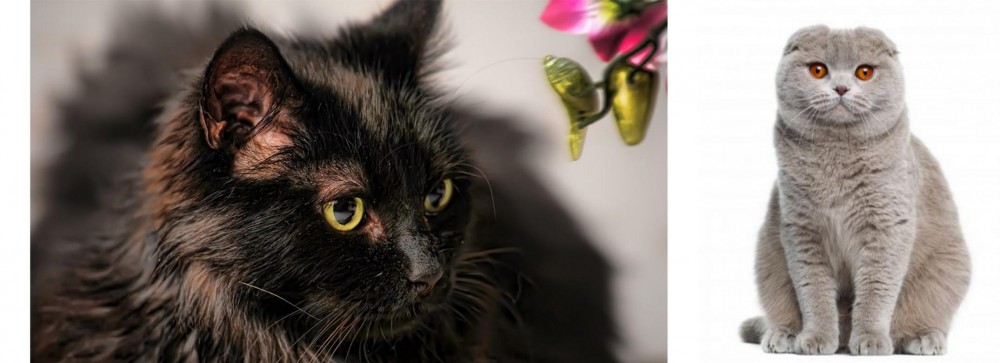 Chantilly/Tiffany is originated from United States but Scottish Fold is originated from United Kingdom. Both Chantilly/Tiffany and Scottish Fold are of same weight. Both Chantilly/Tiffany and Scottish Fold has almost same life span. Both Chantilly/Tiffany and Scottish Fold has same litter size. Both Chantilly/Tiffany and Scottish Fold requires Low Maintenance.
Chantilly/Tiffany is originated from United States but Scottish Fold is originated from United Kingdom. Both Chantilly/Tiffany and Scottish Fold are of same weight. Both Chantilly/Tiffany and Scottish Fold has almost same life span. Both Chantilly/Tiffany and Scottish Fold has same litter size. Both Chantilly/Tiffany and Scottish Fold requires Low Maintenance.
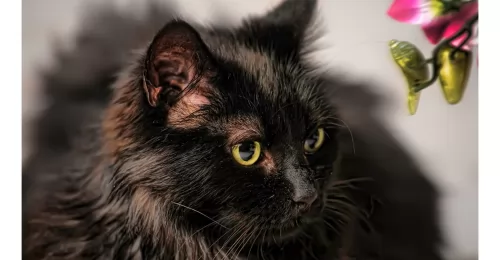 The beautiful Chantilly/Tiffany cat gets people thinking the cat is a semi-longhaired Burmese, but of course, it's not.
The beautiful Chantilly/Tiffany cat gets people thinking the cat is a semi-longhaired Burmese, but of course, it's not.
The way the Chantilly came about was that there were a pair of chocolate-colored cats but their origins were unknown. The first litter of Chantilly kittens was born in New York in 1969 and people were so taken up by the beautiful kittens that a breeding program was started.
The cat was first started as a foreign longhair and then it changed to Tiffany. In a British registry, a cat breed that was a cross between a Chinchilla Persian and a Burmese was named the Tiffanie and renamed Chantilly and referred to as the Chantilly/Tiffany.
The breed is recognized by most major cat registries.
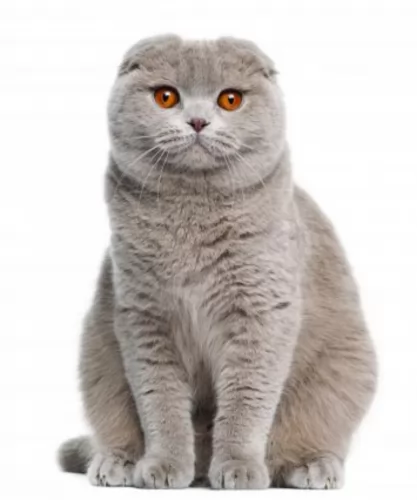 The Scottish Fold is a domestic cat that has an owlish look to it. This is because of the natural dominant-gene mutation that affects cartilage in the cat.
The Scottish Fold is a domestic cat that has an owlish look to it. This is because of the natural dominant-gene mutation that affects cartilage in the cat.
The ears of the Scottish Fold cat folds in a weird way so that the cat has an owl-like look to it. These cats are also known as Highland Fold and Coupari.
It seems that the first Scottish Fold was a white barn cat with the name of Susie. When Susie had kittens, there were a couple of them born with these folded ears. A cat fancier registered the breed in the United Kingdom and in 1966 started a breeding program. These cats were later exported to America.
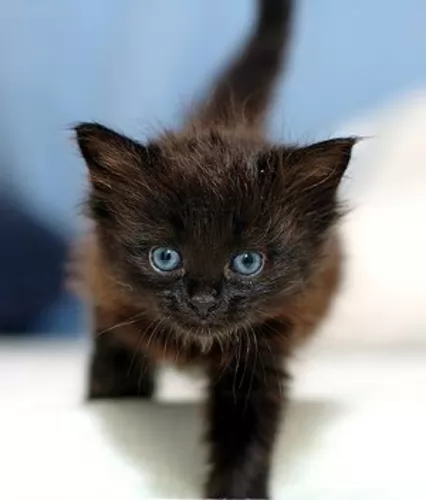 The cat has a fairly broad head with widely spaced ears of medium size. The eyes are oval-shaped and gold in color. The fur is semi-long and there is no undercoat. The tail is plumed.
The cat has a fairly broad head with widely spaced ears of medium size. The eyes are oval-shaped and gold in color. The fur is semi-long and there is no undercoat. The tail is plumed.
Apart from the original chocolate brown of the cat, other colors of the coat can include fawn, cinnamon, black, lilac and blue, with the chocolate brown being the favorite color.
The Chantilly promises to be a devoted and loyal feline companion for you, much preferring the company of his human family than to being alone.
It gets on well with other pets in the house as well as with respectful, gentle children. He isn't a demanding cat and he tries to talk with his family by chirping. It’s a balanced cat, with a fair share of docility and energy, making the cat an ideal companion for single people, couples, families, and elderly people.
It’s a cat that is so devoted, it will follow his human family around the house.
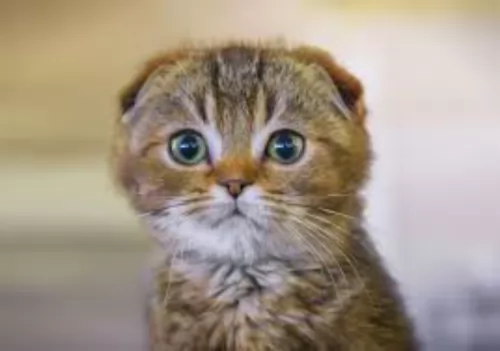 This is a medium-sized cat that weighs between 3 and 6kg. The entire body of this cat is of a rounded nature. The legs are also fairly short.
This is a medium-sized cat that weighs between 3 and 6kg. The entire body of this cat is of a rounded nature. The legs are also fairly short.
All Scottish Fold kittens are born with regular ears but within the first few weeks after birth, the peculiarity with the ears starts to come in. However, some kittens don’t develop folded ears.
The first cats had one fold but with selective breeding, some have 2 or 3 folds or creases so that the ears lie flat against the head. The cat has a round head and large, round eyes. These cats can have a long- or short coat which is thick and soft and the coat can be in a number of colors.
Your Scottish Fold is a good-natured, placid cat and adapts well to different homes and lifestyles. He gets on well with children and pets, becoming just a little bit more attached to the one who feeds him.
He ‘talks’ with quiet meows and purs. They’re playful cats and love to spend time outdoors. A climbing tree and stimulating toys will be a good idea for this energetic feline as he is active and curious. He won’t like being left for long periods though.
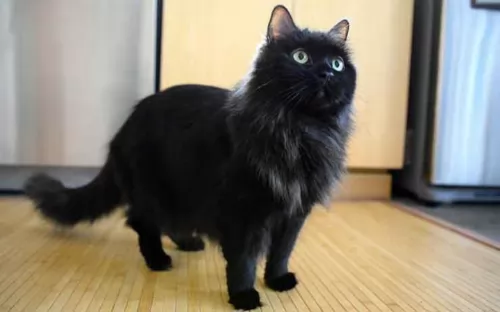 The Chantilly/Tiffany is a gentle and kind breed that is playful and easy-going. They are just your typical middle-of-the-road cats that are not too much or too little of anything.
The Chantilly/Tiffany is a gentle and kind breed that is playful and easy-going. They are just your typical middle-of-the-road cats that are not too much or too little of anything.
The Tiffany is playful, docile, happy and content and he wants to be your friend and companion.
If you are looking for a breed of cat that is loyal to its human family, allow this cat into your home... you won't have any regrets.
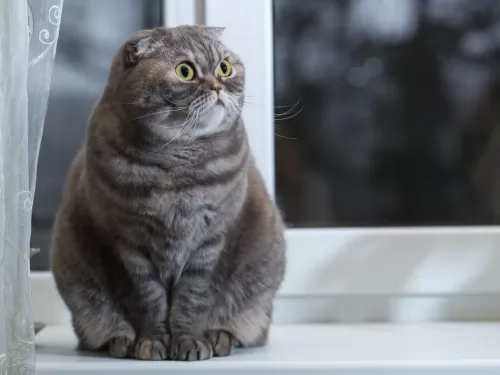 With his big, round eyes, the Scottish Fold has an amicable looking face and he is a friendly calm cat.
With his big, round eyes, the Scottish Fold has an amicable looking face and he is a friendly calm cat.
They love attention and get on well with children and pets who have been trained to be gentle around cats. It is also quite a vocal breed although he 'talks' in a quiet voice.
Because they thrive on pampering and attention, it is better for this cat not to be in a home where the owners are away at work all day.
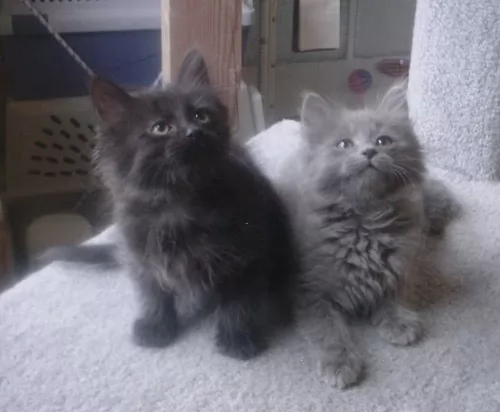 There is no health issue that the Tiffany is prone to. Like any cat, a healthy diet will keep the Tiffany healthy for years.
There is no health issue that the Tiffany is prone to. Like any cat, a healthy diet will keep the Tiffany healthy for years.
These cats are known to have delicate digestive systems so avoid foods with grain if possible. The Tiffany has full hair in their ears, and wax build-up can occur so the inside of his ears must be checked. Checking the ears once a week, as part of a regular routine that includes brushing, and tooth care, should be sufficient to keep the ear canals clear.
Other issues, which are not detrimental but should be kept in mind, are reports that the Tiffany has delicate digestion. This cat relies on a regular diet that doesn't chop and change often.
Because the Tiffany is a low-shedding cat, it is thought to be a popular breed with those people who are allergic to cat hair.
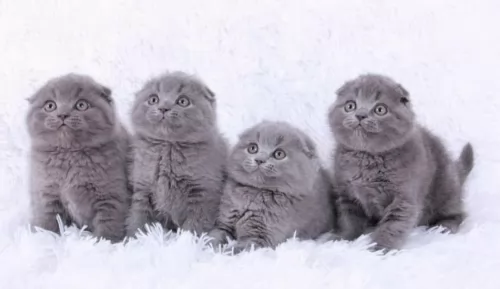 Perhaps one of the things to look out for with these cats is a disease known as osteochondrodysplasia.
Perhaps one of the things to look out for with these cats is a disease known as osteochondrodysplasia.
This is a hereditary disorder of the bones and cartilage. The disease is caused by an autosomal dominant trait and a cat can inherit just one copy of the abnormal gene to have the disease.
Having this disease comes with other health issues and a cat with this disease will be reluctant to jump and may even become lame.
Whenever you suspect anything wrong with your Scottish Fold cat, get him to the vet just as soon as possible.
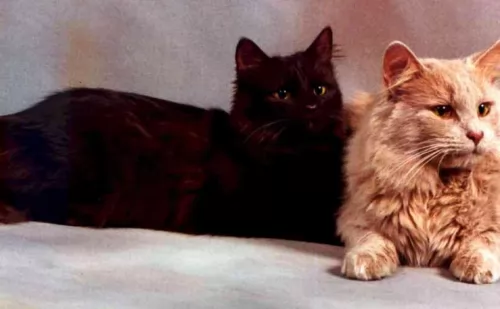 The Chantilly needs an excellet diet and exercise to ensure he doesn’t become to overweght. Remember that cats are carnivores, and this means they have nutritional requirements that can only be met with meat – they can never do well on a diet high in carbohydrates and will develop digestive problems. Your cat will also require clean, fresh water aroud thd clock to ensure his good health.
The Chantilly needs an excellet diet and exercise to ensure he doesn’t become to overweght. Remember that cats are carnivores, and this means they have nutritional requirements that can only be met with meat – they can never do well on a diet high in carbohydrates and will develop digestive problems. Your cat will also require clean, fresh water aroud thd clock to ensure his good health.
Ensure each cat you have has a litter box andencourae good litter box habits by cleaning th litter box every day. Keeping the litter box clean also alerts you anything unusual with your cat’s toilet habits.
Provide your cat with a scratching post and a climbing tree.
The cat doesn’t have an undercoat and is therefore easy to groom. With his semi-long hair, you can brush him once a week to keep the coat soft and shiny. The coat is also low shedding.
Check inside his ears and inside his mouth to ensure there is no redness and signs of infection.
Schedule regular vet visits for your cat for his cat vaccines and for when he is sick.
Spay or neuter your cat to prevent unwanted kittens. Spaying and neutering prevents uterine infections and certain cancers in the felines.
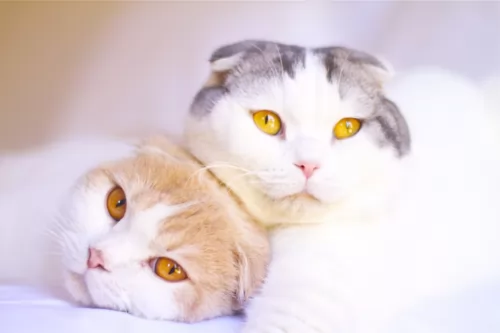 Scottish folds have thick fur and you should at least brush it once a week to get rid of dust and loose hair.
Scottish folds have thick fur and you should at least brush it once a week to get rid of dust and loose hair.
Keep your cat’s nails trimmed otherwise you could get a nasty scratch.
Provide your cat with a climbing tree as well as a scratching post as these are two things – climbing and scratching – that are in the nature of cats.
Provide your Scottish Fold with a litter box and make sure that it is kept clean and that you remove the feces every single day.
Provide your pet with stimulating toys as they are active, intelligent cats.
Protect your cat from fatal cat diseases by having him vaccinated. Your vet will inform you about which vaccines are best. Kittens need vaccines when they are between 6 to 8 weeks old These vaccines come in a series but you don’t have to stress, as the vet will give you a card with the date on which your kitten must return for his next vaccine.
Your Scottish Fold needs to receive the highest quality cat food there is as these foods are balanced with the right amount of vitamins and minerals. When it comes to commercial cat foods, you’ve got choices. You can choose wet or dry food or even combination – something to tempt the fussiest of cats. Cats are carnivores and their food needs to be almost entirely of meat.